Meanwhile, Carson tries the whole “have a catch” thing with the Peaches, reclaiming what we loved, so on and so forth — and hahahaaaa that’s gonna be a big NOPE as the Peaches almost immediately descend into in-fighting and bickering. You wanna talk about overwhelm? Carson is in over her head.
Her lips quiver.
Lupe asks what’s wrong with her face.
Jess (who’s sporting a black eye from last episode’s fight) warns her, don’t you — don’t you do it. Don’t even think about it.
Carson crumbles. It’s too late.
Lupe gets the honor of saying it in the show, but let us all say it together right now, as is the divine right of our people.
1…
2…
3….
“THERE’S NO CRYING IN BASEBALL!”
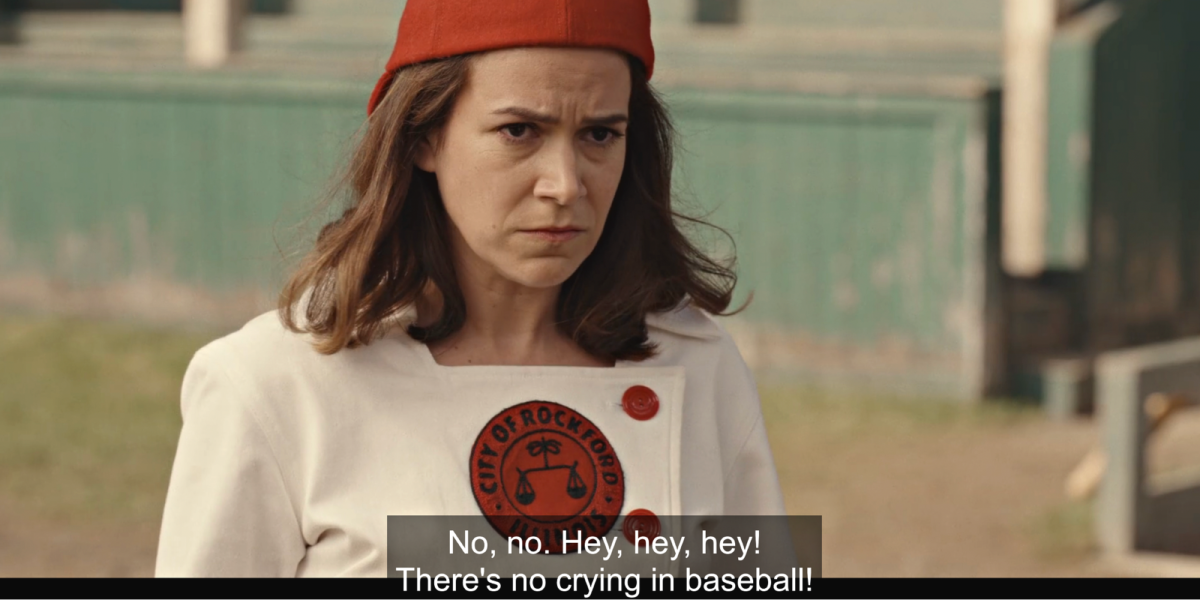
(By the way, Carson calls Lupe a head case, which… again… feeling mighty white of you there, Carson. Lupe will later disparagingly call herself a “head case” while throwing balls against the team house to check her arm. And that’s what happens when you are racist and ableist and also 🎵 ableism is often tied to white supremacy, these things don’t exist in a vacuum, lalalaaa 🎵)
That night, Sarge tells Carson that “unmarried women are always a half step away from being an angry mob” and that she should toughen up and own her power. Be the boot! I still don’t quite get what “be the boot” means and I’ve watched this scene 3x, but fuck it — it sounds cool. Be! The! Boot!
The next day, Carson will take the “be the boot!” theory out for a walk in the team locker room, to mixed results. Though Greta does find Carson being an asshole to be hot, which she shares in their daily shed car make out session. Carson wants to engage in the time-honored queer tradition of Processing Our FeelingsTM but Greta’s shutting that shit down. She’s worried about how sloppy she’s gotten lately, she worries that Jo was right. So instead, Carson and Greta fight.
Later, Jo and Greta share cigarettes. Yes, Jo was the one who was so worried about following the rules, but right now in this moment? She’s feeling hopeful. After Dana, Greta’s first love who we later find out was sent away by her family for being gay, they had to be so careful. But now? Look at them. They are playing professional baseball, the world is changing. And Greta, Jo’s oldest friend, seems genuinely happy with Carson. Jo wonders out loud, “so what if right here, right now, we forget the rules, both of us. Wouldn’t that be nice?”
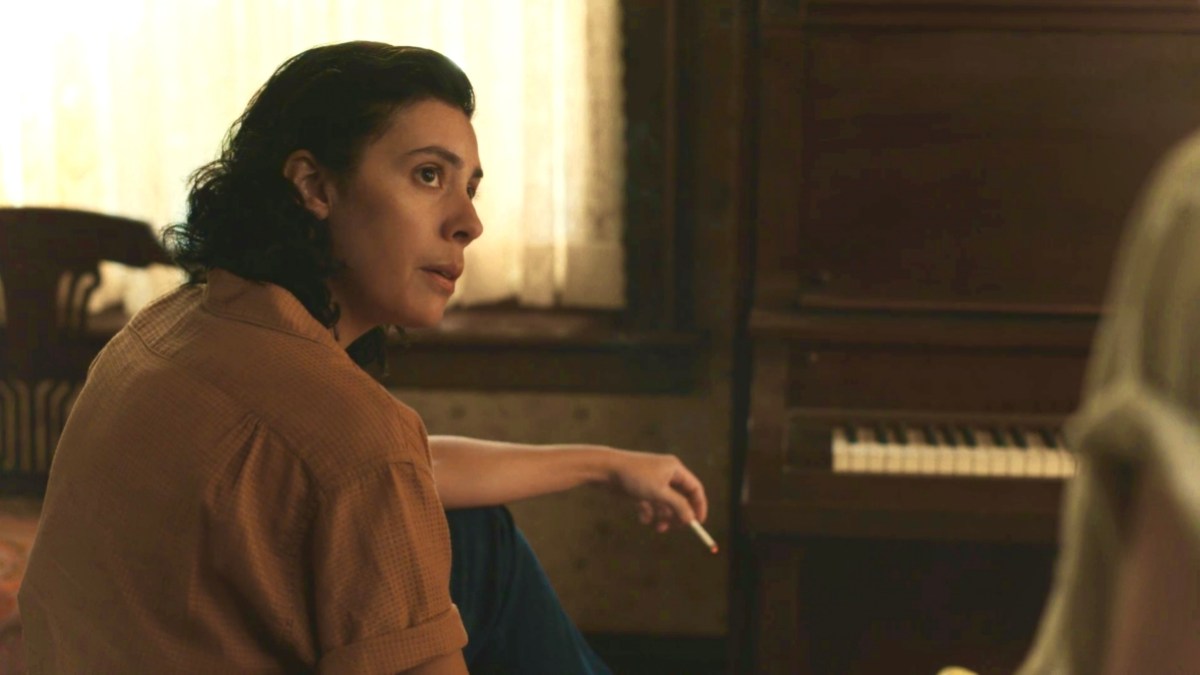
In the living room, Jess throws Lupe a pillow “for your ass. It’s getting soft from sitting on the bench so long” — Jess is over it, they were supposed to brothers. They were both supposed to be about winning, and right now Lupe is holding the team back.
But Jess isn’t the only one who is over it.
Lupe: She grabbed me. But I’m the ‘fiery troublemaker’? She started the fight, not me. She had secret practices behind my back. She drove Dove away. And now she gets to coach! She didn’t even want that. Just had it handed to her. And you… never wondered why that is? Hermano.
Lupe takes a resigned exhale. Jess casts their eyes up towards the ceiling, caught, then back at Lupe, not knowing exactly what to say. Jess hadn’t thought about it like that before. Lupe points out, Jess hasn’t had to. White privilege and white investments work to mask themselves.
Even if we’ve all seen it, I’m grateful the show directly addressed the unequal treatment between Lupe and Carson, the team’s racist framing of Lupe being “lazy” or a “troublemaker,” and that Lupe gets to say her own peace. I think that even a few years ago, a different version of this show might have made a different (and worse) storytelling decision. As a matter of craft, it doesn’t feel like exposition, but a genuine moment of connection between Jess and Lupe, brothers on the team. I’ve had conversations like this with white friends, and it’s never easy. Not all of those relationships survived it, but the ones that did are stronger and deeper. I wish the same for the hermanos.
At the same time, however, it’s hard not to notice that Lupe’s critiques are not taken to Carson directly — which is a misstep. The two later make up, with Carson telling Lupe to stop wrecking her arm over Dove’s forkball and to throw her own pitches instead, but the reconciliation is not on Lupe’s terms. Instead, it comes from a confrontation between Carson and Max.
Speaking of which, what has Max been up to? Extreme Gay Panic, that’s what!

Max goes to Toni’s hair salon after hours, surprising them both. She asks her mother to do her hair, “any style that you think will look nice” — even though she almost never lets Toni touch her hair at all.
I’ve never known an intimacy like my mother’s hands in my hair. For me, it’s warmth and safety and sacred. It’s been a place of kindness, even when I didn’t know how to be kind to myself. And that’s not to say that there isn’t a lot (a lot) of judgement also wrapped up in Black hair. There’s respectability politics and white standards of beauty and criticism. But those cuts burn so deep because of the intimacy that’s at the root to begin with. The vulnerability of baring your scalp to be nurtured and cared for by the same hands that brought you into this world, that fed you when you couldn’t feed yourself. The opening yourself up to the pain that same vulnerability can uncover.
Which, of course, is also why this scene broke me. Max isn’t coming to her mother for comfort, even though I think she thinks she is. She’s coming to her mother because seeing Bertie scared Max of a possibility she never knew was in front of her. So instead she’s back here, trying desperately to be the daughter her mother always wanted her to be.
In the most intimate way possible, Max is silently asking her mother for acceptance. She’s willing to rip herself into a million pieces to do it. And either because she doesn’t notice, or doesn’t care to notice, Toni lets her. At the precise moment when Max needs her the most, when a mother is supposed to fill your cup, Toni instead manipulates their closeness and drains her. Referencing their argument, Toni tells her daughter that she’s always liked her. She likes her fire. Her personality. Her hair. She’s always had such good hair.
Next, Max — with her newly femme, Mis Toni approved hairstyle — knocks on Gary’s door. She would like have The Heterosexual Sex please, with Gary (of can’t play baseball worth a damn and got his ass beat fame). Gary starts to question if they should slow down but Max is a woman determined and so here they are, having very lackluster sex while Gary says Max is the most beautiful thing he’s ever seen (and I believe her really means it) and Max tries to look anywhere but the baseball posters on his walls, a lump in her throat.
It’s over quickly and please give Chanté Adams an Emmy for the ultimate dime drop beat exchange from the sadness of their sex to the comedy of Max popping up to get dressed because she has to bake a pie (!!!) — anything to get out of there as fast as possible.
Later, Max has a catch with Carson (I told you it was sticking) and, after noticing her wedding ring, asks Carson about Greta. Of course Carson assumes that Max wants to know how could she have sex with Greta if she has a husband. But actually Max wants to know how she could have sex with him — they look at each other, a little flummoxed at what Max is admitting in this moment. Carson says sex with a man can be nice sometimes (Max says they can agree to disagree lol), and then admits her bigger problem is that she… she might love Greta. Now they’re both stunned again, this time at how honest and close they are becoming, so quickly.
Then Carson says, “wow I wish I could talk to my pitcher like this” and the entire house of cards falls down.
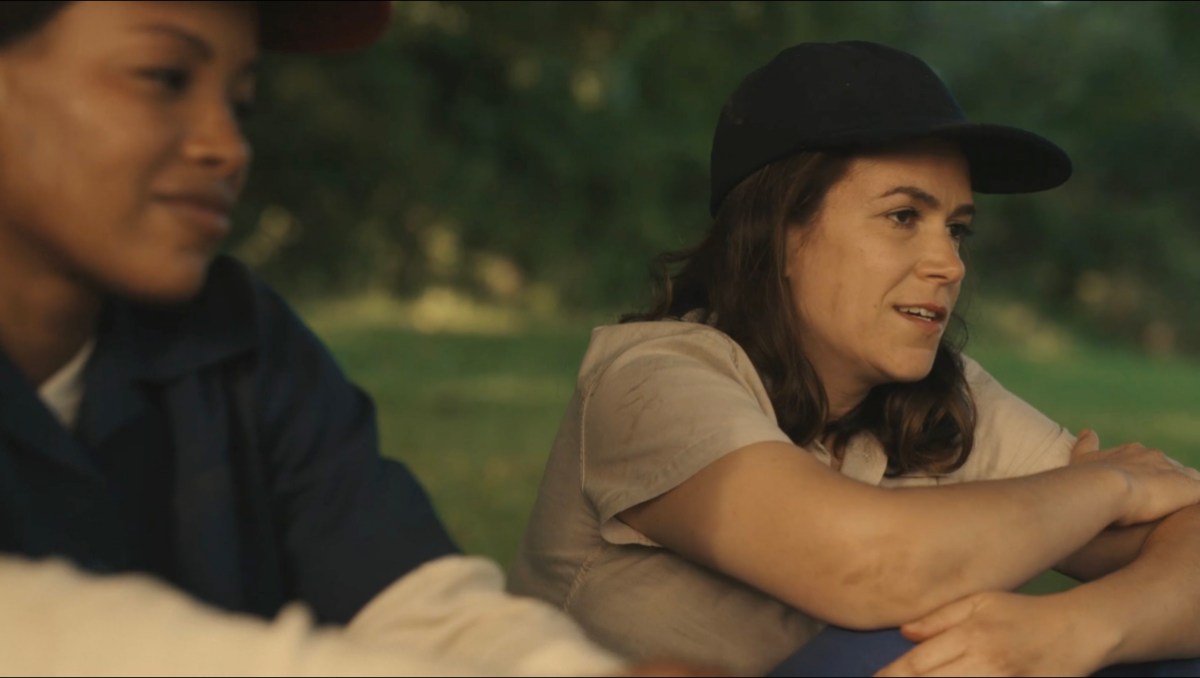
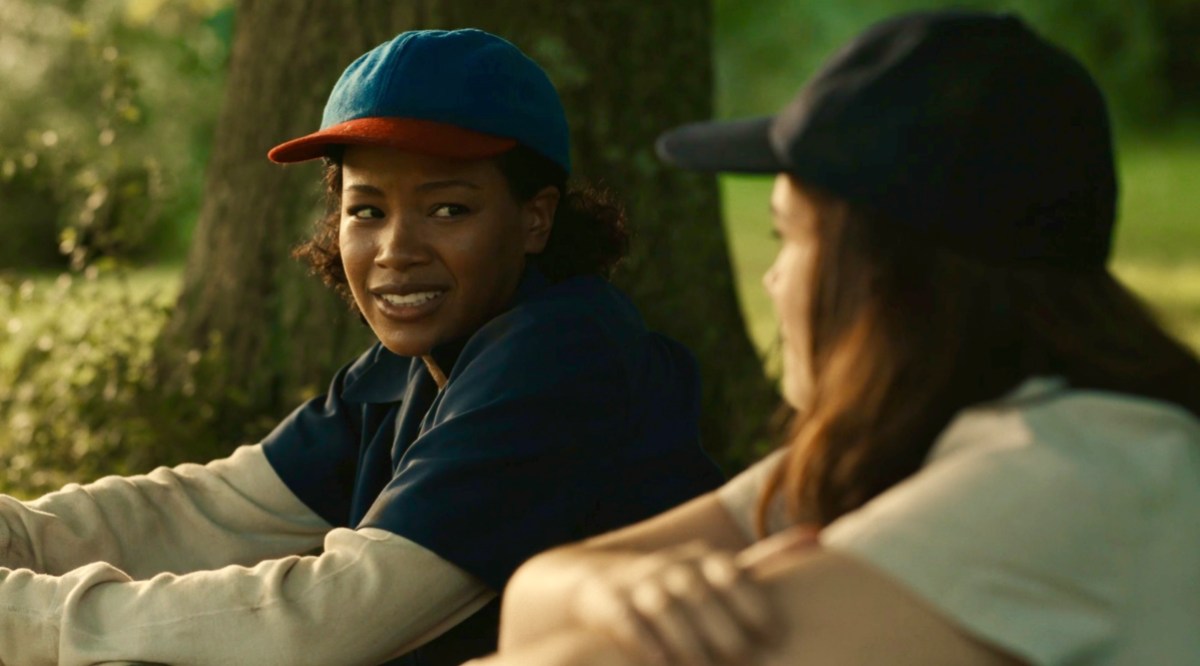
First of all, it was not (and will never be) Lupe’s fault that Dove latched on to her like the white colonizer he was and named her the “Spanish Striker” for him to imprint on. It’s largely Carson and Greta’s fault that the team isolated Lupe, and she never stopped it.
But second, Max asks, where was this same “oh you are so talented!! I wish you were my pitcher!!” energy when she was getting thrown out of AAGPBL try outs?!? Oh that’s right, it was non-existent. Carson was there. She saw Max pitch. She knew Max was the best woman out there and she said absolutely nothing. None of them did. They all just watched, safe in the bubble of their white privilege, as Max’s dream died. So no, fuck off with “I wish you were my pitcher.” That is not a thing that Carson gets to say.
OK. Max doesn’t say “fuck off,” that’s me — but the points are made and I’m glad Max made them. Still, and I have to say it again, Max is not the only person of color that Carson has wronged. The fact that Carson’s not also confronted by her own teammate allows her white privilege to remain unchecked in the eyes of the Peaches. It also robs the audience of a model for sustained accountability, growth, and makes the subsequent repairing of Lupe and Carson’s relationship feel a bit hollow.
Max ultimately leaves the field, muttering “I can’t keep doing this to myself,” before going home to Clance. She tells her best friend that she’s done with baseball. She doesn’t know who she is without it, and maybe that’s been the problem all along.
Carson apologizes to the Peaches, who finally win a game! In the celebration at the house, Jo and Jess “shower” Lupe with congrats by way of shaken up beer bottles and damn the queer brotherhood of this show remains one of my all time favorite things. Greta tells Carson the truth about Dana — the first time she’s been vulnerable with her.
Carson promises that they won’t get hurt, but there’s no way for her to promise that.
And Max? Max goes back to Bertie’s.
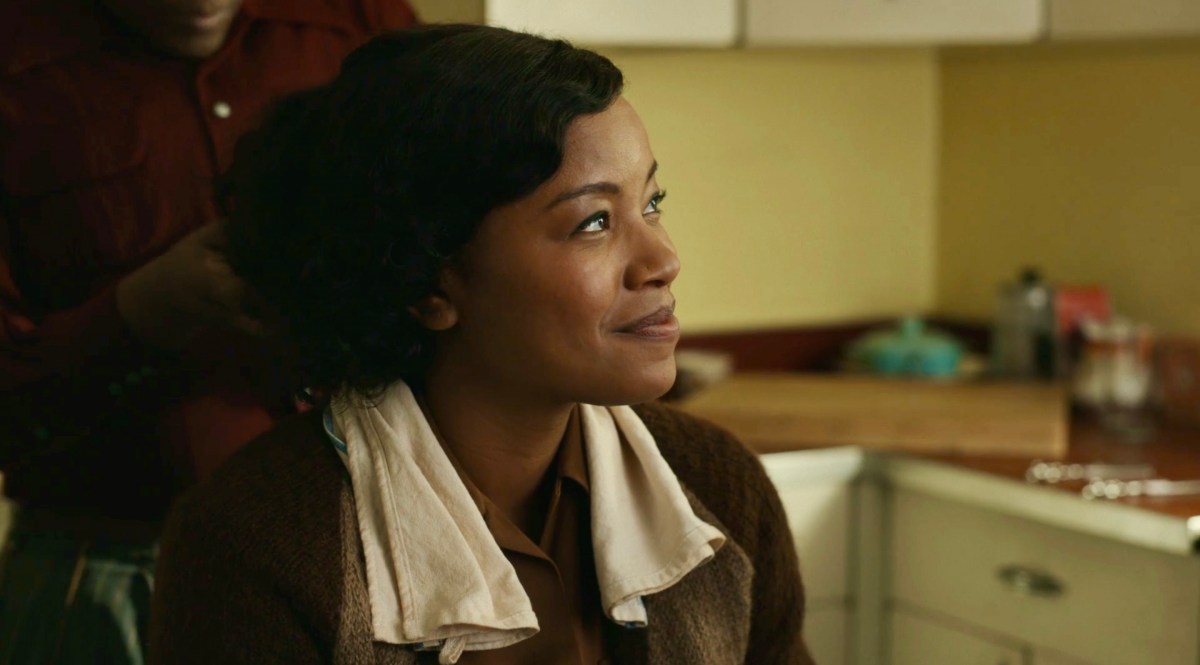
Max sits in Bertie and Gracie’s warm yellow kitchen on a stool. Three Black queer people, across two generations, creating a new family other their own, rooted in our oldest traditions. The kitchen hair salon goes back as far as Black folks. It’s on purpose that it’s here. Bertie asks if Max is sure about this.
Max inhales and licks her bottom lip before letting her teeth graze across it. Miss Toni said that Max’s hair was one of the things she liked most about her, so yes, this is the first step to Max figuring out who she is on her own. She’s sure.
Gracie promises that Bertie’s going to make sure she looks real good, Bertie walks behind Max to put a towel on her shoulders.
“Your mama and I learned how to cut hair together.” Bertie starts to hum as she opens and closes the scissors. Max lets out a stuttered breath. The camera comes in close on Chanté Adams’ face. Her shoulders are still tense — but her eyes flutter open, her brain trying to place where she’s heard that song before.
“Mama always sings that.”
“Well, maybe you came here to find a piece of home.”
Bertie goes back to humming and Max blinks her eyes slowly, considering every step on every broken road that has brought her to this moment. Her cheeks move slowly, so slowly, each muscle becoming a barely there smile. Her shoulders finally drop.
I think a lot of times when we talk about queer television, we think about romance. We want to know “how many episodes until it gets gay” — and we usually mean how many episodes until the gays flirt, until they kiss. And that makes sense, of course. Queer love stories are still rare, the kind that make your heart fill and knock and pour out. The kind that make you feel like someone out there will keep you safe and warm.
That’s also not the only kind of love story.
I still haven’t gotten over it. I feel like I’ve been replaying this scene in my mind like how you move a pencil between your fingers, marveling at the wonder of its balance, as if nature still has a a magic trick that you’ve never seen before. The care for Black queerness, back then. We somehow always found each other, loved on each other, even back then.
Quietly, in the safety of her own queer family that she never knew she had, Max finds peace. In the intimacy of her Bertie’s hands through her hair, she finds a new path. It’s everything she looked for in Toni’s salon, and instead came away with panic and fear — but here, there’s safety. And maybe, just maybe, Bertie’s right. Maybe it can be home.
Every episode of A League of Their Own is streaming on Prime Video. Editor in Chief Carmen Phillips and Senior Editor Heather Hogan will be trading off recaps, one a day, every single day, for the whole first season. See you back here tomorrow!







